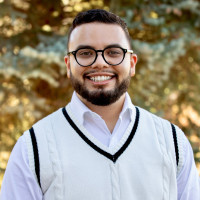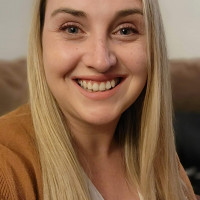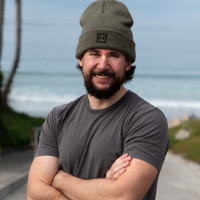Over the next few months, California Sea Grant will highlight the work of our State Fellows. The State Fellowship places graduate students in 12-month paid roles with the agencies and organizations that plan, implement and manage ocean policies and programs in California. This month, in the second in the series, we’re looking at several agencies in Southern California.
California coastal commission
Brandon Quintana

As a master’s student studying biological sciences at California State University, Fullerton, Brandon Quintana knew that to fully understand coastal management, we have to consider the impacts not just on ecosystems, but on human communities, too, especially in urbanized ecosystems that are near low-income communities.
For Quintana, then, the California Sea Grant State Fellowship, with its focus on providing recent graduates with experience in policy and management organizations, was a natural fit. So too was his placement with the California Coastal Commission (CCC) which plans and regulates the use of land and water in the coastal zone.
Quintana cites that broad mission in explaining why he was enthused to work in this office: “It’s like everything everywhere all at once,” he says. Now he’s developing guidance about how to integrate environmental justice initiatives into nature-based adaptation strategies, such as living shorelines. That means engaging with the public to understand housing needs in the coastal zone and partnering with nonprofits and governmental agencies to develop policy. “I’m gaining a really wide breadth of experience,” he says — which has upped his ambitions: When he told Kate Huckelbridge, CCC’s executive director, that he wanted to be a coastal manager, she told him he should aim to be an executive director himself. “And I was like, ‘Okay, with this experience, I’m on my way there.’” (You can read more of Brandon’s story here.)
Port of san diego
Chelsea Bowers-Doerning

At the same time that Chelsea Bowers-Doerning launched her master’s research at California State University Fullerton — examining microplastics in the guts of commercial fish — California began instituting bans on plastic straws. Since she’d bartended to pay her way through school, Bowers-Doerning understood the issue from all sides. The experience helped her see how science and policy are connected: to make a real difference in the world, she needed to know enough science “to be dangerous,” as she puts it — but the experience to implement policy, too.
Since her coursework at Fullerton offered little exposure to policy, Bowers-Doerning pursued the California Sea Grant State Fellowship. “This was the best opportunity for me to go head-on into it,” she says. She was placed with the Port of San Diego, which, given its name, might easily be misperceived as just an industry-focused transit hub. But through its Environmental Conservation Department — where Bowers-Doerning now works — the port also protects and conserves the region’s natural coastal resources, including endangered species and delicate wetlands. Bowers-Doerning has had the chance to write grants to raise money to eradicate an invasive algal species and develop plans to rejoin the Sweetwater Marsh Unit and the F & G Street Marsh Unit within the San Diego Bay National Wildlife Refuge, which were separated by various industrial activities between 1916 to 1975. She is also working to develop an accessible dashboard that will allow the public to access the department’s biological surveys.
“I’m building my toolkit,” she says. “I’m learning the full pipeline, how to go from start to finish, from research to actual implementation on the ground.” And that, she says, will make her all the more dangerous.
Jason Gonsalves

Jason Gonsalves knew that his master's of marine science at San Jose State University provided a firm academic foundation. “But I didn’t want to be a scientist just for the sake of doing science,” he says. “I wanted to be a scientist for the sake of helping other people — doing projects that have a meaningful result.” So Gonsalves sought exposure to policy and management. And, like Bowers-Doerning, he figured that the California Sea Grant State Fellowship might go beyond exposure to deliver real experience.
When he arrived at the Port of San Diego, Gonsalves knew it ranked among the world’s greenest seaports. “There was one exception,” he says, “and that’s underwater noise.” He was both delighted and intimidated when his supervisors in the Environmental Conservation Department asked him to tackle the issue.
Before starting the fellowship, “I knew absolutely nothing about underwater noise,” Gonsalves says. “I mean, I hardly knew it was an issue.” Now he’s become fluent not just in the policy and regulatory environment, but the physics and ecological impacts of underwater acoustics — a necessary education, since Gonsalves now leads the port’s underwater noise program. “I’ve never been in that position before, and it really elevates my career,” he says. It’s also rerouted his career path: “Underwater noise is a growing field,” he says. “And I’d like to grow with that field.”